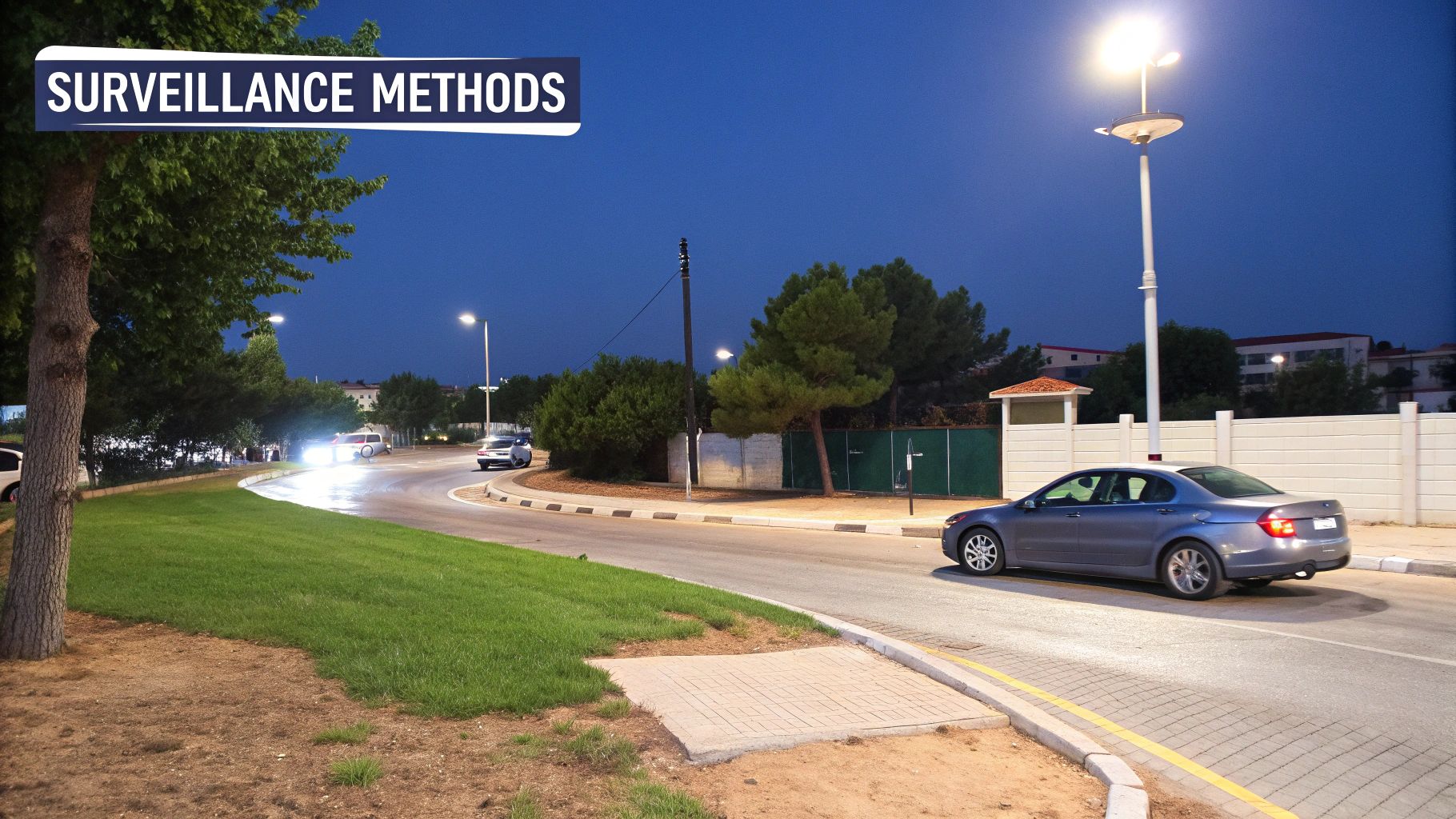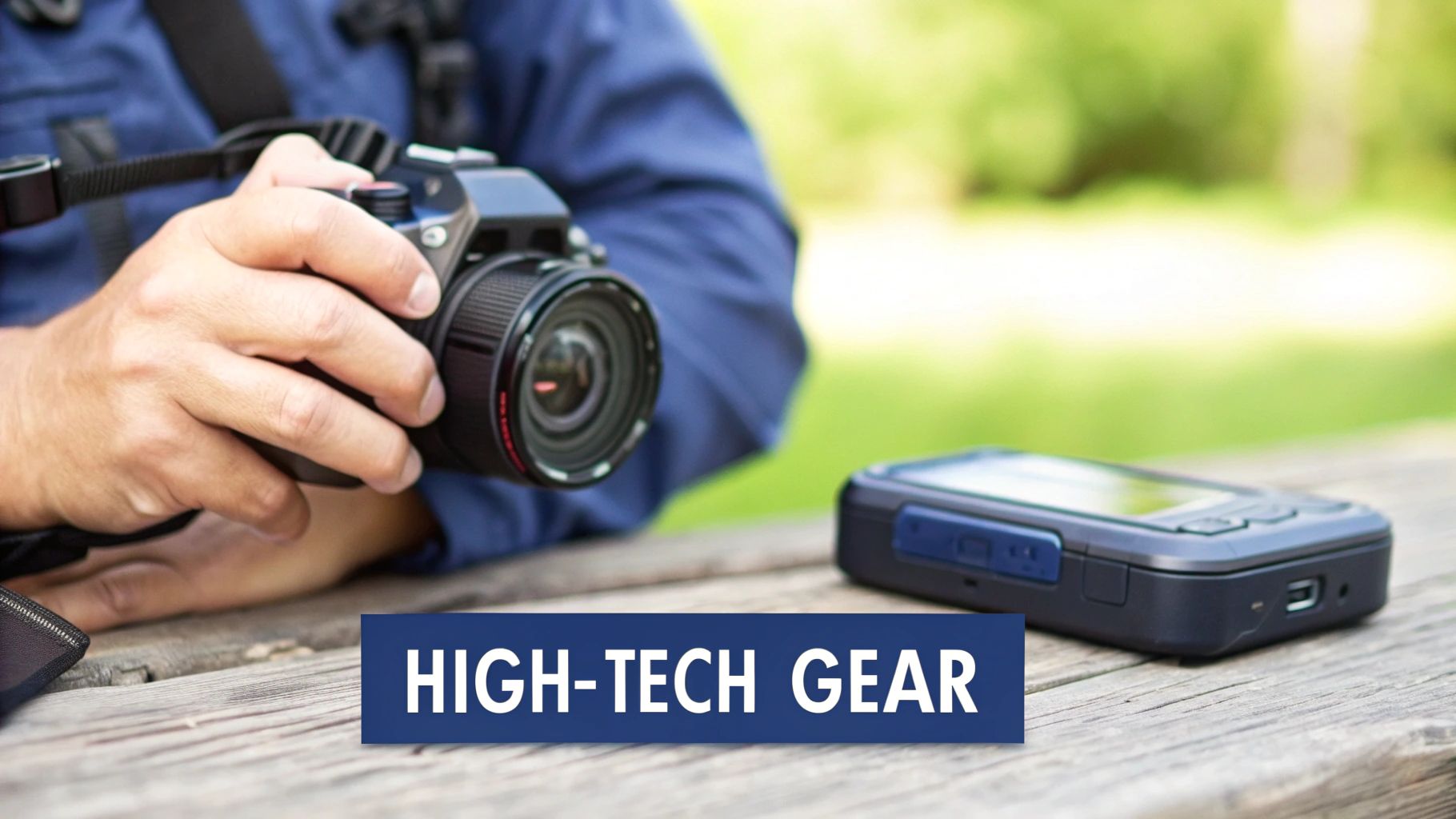Private Investigator Surveillance: Complete UK Guide
- Sentry Private Investigators

- May 29, 2025
- 12 min read
Updated: Jul 28, 2025
Understanding Modern UK Surveillance Operations
Private investigator surveillance in the UK is a dynamic field. It blends traditional observation methods with cutting-edge technology. This means investigators need a diverse skillset. They must be comfortable both blending into their surroundings and using sophisticated equipment to gather comprehensive evidence.
Today's private investigator isn't just a shadowy figure lurking in doorways. They are skilled professionals using a variety of techniques to uncover the truth. This blend of traditional and modern methods ensures the most accurate and detailed information is collected.
The Evolution of Surveillance Techniques
The classic stakeout still has its place in modern surveillance. However, it is often enhanced by tools like GPS tracking and discreet cameras. Even the analysis of digital footprints plays a role. These advancements allow investigators to cover more ground and collect more detailed information than ever before. Modern surveillance also requires a strong understanding of data privacy laws and ethical considerations.
Investigators must not only be proficient in using technology, but also responsible in its application. They must operate within the boundaries of the law and uphold ethical standards.
Real-World Applications of Surveillance
Private investigator surveillance is valuable in many situations. These range from corporate fraud investigations uncovering embezzlement to matrimonial cases providing evidence of infidelity. The applications are diverse. Tracking down missing persons and gathering evidence for legal proceedings are also common uses for surveillance.
Other uses include verifying workplace injury claims and investigating employee misconduct. The demand for professional detective services has led to significant growth in the UK's private investigation industry. This growth is linked to the increasing complexities of modern life. Businesses face threats like fraud and internal misconduct, while individuals may require assistance with personal matters. You can explore this topic further here.
The Importance of Discretion
Discretion is essential for private investigators. Operating undetected ensures the integrity of the investigation and the safety of everyone involved. This requires careful planning, meticulous execution, and a thorough understanding of the legal landscape. Professional surveillance can uncover crucial evidence that other methods miss. This provides vital insights for both individuals and businesses.
Surveillance is a powerful tool when used responsibly and effectively. It can provide answers and bring clarity to complex situations.
Navigating Legal Boundaries and Compliance

When considering hiring a private investigator for surveillance, it's essential to understand the relevant legal landscape. This knowledge is crucial for two main reasons. First, it helps ensure any evidence gathered is admissible in court. Second, it protects you from potential legal issues. Using illegal methods can not only harm your case but also expose you to legal action. This section explores key aspects of UK surveillance law related to private investigators.
Understanding the Limits of Private Investigator Surveillance
Private investigators in the UK operate within a specific legal framework. This framework defines what actions they can and cannot take during surveillance. This balance is crucial for protecting individual rights while still allowing for effective investigations. Learn more about the legal parameters of private investigation work in the UK: What a private investigator can legally do.
Permitted activities include surveillance, tracing individuals, background checks, serving legal documents, asset tracing, and fraud investigations, all conducted within legal boundaries. However, certain activities are strictly prohibited. These include hacking phones, accessing private bank accounts without consent, wiretapping, trespassing, impersonating police officers, and unauthorised installation of tracking devices. Understanding these limitations is essential for anyone considering hiring a private investigator.
Data Protection and Surveillance: A Delicate Balance
UK data protection laws, particularly the General Data Protection Regulation (GDPR) and the Data Protection Act 2018, have a significant impact on private investigator surveillance. These regulations protect personal data and strictly control how it's collected, used, and stored.
This means private investigators must adhere to stringent guidelines when handling personal information obtained during surveillance. Failure to comply can lead to substantial fines and legal consequences. Therefore, engaging a reputable, legally compliant investigator is paramount.
Ethical Considerations in Private Investigation
Beyond legal compliance, ethical conduct is fundamental in private investigation. Reputable agencies adhere to high ethical standards, ensuring their operations are both legal and morally sound.
This includes respecting privacy, maintaining confidentiality, and acting with integrity throughout the investigative process. This focus on ethics promotes professionalism and builds trust between the investigator and the client. For further information on the legality of private investigators in the UK, see this article: Are private investigators legal in the UK? Find out now.. Understanding the ethical standards of the profession empowers clients to choose investigators who prioritise responsible practices.
Advanced Surveillance Techniques That Actually Work
Let's move past the legal discussions and dive into the practical surveillance techniques used by private investigators. Forget Hollywood; this is about real-world methods that get results. Professional investigators tailor their approach based on the environment, the target's actions, and the case's goals.
Blending Technology With Traditional Skills
Technology enhances, not replaces, core observational skills. High-resolution cameras, for example, capture important details from afar, while GPS tracking, within legal limits, provides real-time location information. But human insight remains vital. An investigator's ability to interpret behavior, blend in, and make quick decisions on the ground is invaluable.
Surveillance, particularly involving drones, must follow legal rules. Learn more about these regulations in our guide on mastering the drone laws. This ensures that gathered evidence is usable in court and the investigation stays legal, maintaining integrity for any legal action.
Mobile vs. Static Surveillance: Adapting to the Situation
Mobile surveillance involves following a target, usually in a vehicle, demanding strong driving skills and discretion. Static surveillance means observing a fixed location. Each has its challenges. In cities, staying hidden is tough, while rural areas may lack good vantage points.
Experienced investigators choose the best method for each case. They study the target's habits and the surroundings to pick the most effective tactic.
Maintaining Cover and Gathering Evidence
Staying hidden is critical. This means blending in and predicting the target's moves, adapting to surprises. Investigators use tricks to avoid detection, like changing their appearance and using multiple vehicles. Their goal is to collect key evidence without being noticed, ensuring the evidence's integrity and the operation's success. Successful private investigation relies on careful planning, precise execution, and the ability to adjust to changing circumstances.
Professional Standards That Define Quality Service

Unlike regulated professions, the UK's private investigation sector doesn't require mandatory licensing. This makes selecting a qualified professional for private investigator surveillance crucial. Finding the right investigator involves looking beyond appealing websites and focusing on verifiable credentials.
How can you identify a truly professional service? It's about confirming qualifications and understanding the role of professional organisations. Choosing the right investigator can significantly impact the outcome of your case.
The Association of British Investigators (ABI), founded in 1913, plays a vital role in the UK's private investigation landscape. It establishes professional standards and promotes ethical conduct within the field. Learn more about the ABI here.
Interestingly, the UK, unlike the United States and France, does not have a government-mandated licensing system for private investigators. This emphasises the significance of voluntary organisations like the ABI in maintaining professional standards.
The Role of Professional Bodies
Organisations like the ABI and the Institute of Professional Investigators offer vital support to investigators.
They provide training programs
Establish codes of conduct
Support continuing professional development
This commitment to best practices keeps investigators informed about legal updates and evolving technologies. These resources are invaluable for those dedicated to delivering quality service.
Ongoing Professional Development
Top private investigators go beyond basic requirements and pursue ongoing training. They might take specialised courses in areas like:
Surveillance techniques
Legal updates
Technological advancements
This dedication to professional growth allows them to stay ahead in the field.
Adapting to Change
The field of private investigator surveillance constantly changes due to new technologies and evolving legal landscapes. Professional bodies help investigators navigate these shifts, ensuring their methods are effective, ethical, and legally sound.
For instance, the growing use of digital technology requires investigators to understand data protection laws and cyber security. This protects client confidentiality and ensures collected evidence is admissible.
Verifying an Investigator's Credentials
It's essential to verify an investigator’s membership in reputable professional organisations. This confirms their adherence to industry standards and ethical guidelines. During consultations, ask about:
Qualifications
Experience
Continuing professional development
These questions will help you assess their commitment to professionalism and increase your chances of a successful outcome.
Selecting Surveillance Services That Deliver Results
Choosing the right private investigator for surveillance in the UK isn't just about price. It's about finding a professional who can deliver the results you need. This means carefully considering their experience, technical skills, and how they manage their cases. Making the right choice is crucial for a successful outcome.
Evaluating an Investigator’s Track Record and Expertise
Start by looking closely at the investigator's background and experience. Look for proven success in cases like yours. Membership in professional bodies, such as the Association of British Investigators (ABI), shows a commitment to ethical practices and high standards. Don't hesitate to ask for testimonials or case studies to understand their past performance. This due diligence can save you time, money, and potential legal trouble. A proven track record speaks volumes.
Assessing Technical Capabilities and Resources
Modern private investigation relies heavily on technology. Make sure the investigator is skilled with equipment like high-resolution cameras and GPS trackers (used within legal limits). They should also be proficient with other relevant tools. The right tools are essential for gathering solid evidence.
Video surveillance makes up 40% of the techniques used. Physical stakeouts and digital monitoring each account for 30%. This highlights how important it is for investigators to be skilled in both traditional and modern methods. The right mix of skills and technology is essential for a thorough investigation.
Understanding Their Case Management Approach
When you first talk to an investigator, ask about how they manage their cases. A clear, well-defined process shows professionalism and organisation. Ask specific questions about communication, how often they'll give you updates, and how they handle unexpected issues. A structured approach makes investigations efficient and effective.
For example, a good investigator will keep you updated on their progress regularly. They should also be flexible and adapt their strategies as needed. They should have a clear plan for handling evidence to make sure it's admissible in court. Be wary of investigators who make guarantees or unrealistic promises. This can be a warning sign. Transparency and open communication are key for a smooth and productive working relationship. This builds trust and ensures everyone is on the same page.
Identifying Red Flags and Ensuring Legitimate Operations
Be careful of investigators who operate outside legal and ethical boundaries. Make sure they comply with UK data protection laws, especially the GDPR. Check their credentials and professional affiliations. Choosing a reputable investigator protects you from legal problems. Also, ask about their insurance and how they handle sensitive information. These are important aspects of professional practice.
The table below summarises key factors to consider when choosing a private investigator. It highlights what to look for and potential warning signs to watch out for.
Key Factors When Selecting a Private Investigator Essential criteria for evaluating surveillance service providers including qualifications, legal compliance, and service offerings
Evaluation Criteria | What to Look For | Warning Signs |
|---|---|---|
Experience & Track Record | Proven success in similar cases, testimonials, case studies, membership in professional organisations (e.g., ABI) | Lack of verifiable experience, reluctance to provide references, exaggerated claims of success |
Technical Capabilities | Proficiency with modern surveillance equipment (cameras, GPS trackers), knowledge of relevant software and techniques | Outdated equipment, lack of technical expertise, reliance on outdated methods |
Case Management Approach | Clear communication protocols, regular reporting, flexibility in adapting to changing circumstances, evidence handling procedures | Vague or inconsistent communication, unrealistic promises or guarantees, lack of a structured approach |
Legal & Ethical Compliance | Adherence to UK data protection laws (GDPR), valid credentials and licenses, professional insurance coverage | Operating outside legal boundaries, disregard for privacy regulations, lack of transparency |
By asking the right questions and checking information, you can find a legitimate and experienced professional. This protects your interests and ensures the integrity of the investigation. Someone who will deliver reliable results within legal and ethical boundaries.
Understanding Surveillance Investment and Value

Let's talk about the cost of hiring a private investigator for surveillance in the UK. Knowing what influences the price is key to budgeting wisely and getting the most for your money. Several factors play a role, from the complexity of the case to the equipment needed. Understanding these costs helps you make smart decisions.
Factors Influencing Surveillance Costs
Several things determine the final cost of private investigator surveillance. Case complexity is a major one. A straightforward case, like verifying an address, costs less than a complex investigation involving multiple people and places. This makes sense, as complex cases demand more resources.
The length of surveillance also matters. Longer operations naturally cost more. A week-long surveillance operation, for example, will be more expensive than a single day. This is due to the increased investigator time and resources involved. Specialised equipment, such as high-resolution cameras or GPS trackers, also increases costs.
Travel is another factor. If the surveillance is outside the investigator's normal area, expect to pay for travel expenses. All these elements contribute to the total cost.
Pricing Structures: Hourly, Daily, and Package Deals
Private investigators typically use different pricing structures. Hourly rates are common for shorter, more predictable jobs. Daily fees are often used for surveillance operations. Some investigators offer package deals that bundle services for a fixed price, which can be cost-effective for longer or more complex investigations.
Each pricing structure has advantages and disadvantages. Hourly rates offer flexibility, while daily fees provide predictable costs. Package deals can be a good value, but ensure they cover everything you need. The best choice depends on your specific situation.
To help you understand typical costs, let's look at a breakdown of common pricing structures and the factors that affect them:
Typical UK Private Investigator Surveillance Costs
Service Type | Typical Rate Range | Factors Affecting Cost |
|---|---|---|
Single Day Surveillance | £500 - £1,200 | Location, target's routine, required equipment |
Multi-Day Surveillance | £400 - £1,000 per day | Number of days, complexity of the case, travel expenses |
Address Verification | £130 - £300 | Location, difficulty of verification |
Background Checks | £200 - £500 | Depth of the check, availability of information |
Keep in mind that these are just estimates, and actual costs can vary. Discussing your specific needs with a private investigator will give you a more accurate quote.
Additional Costs and Budgeting
Besides the basic fees, be prepared for potential extras. These could include mileage, report preparation, or specialist equipment costs. Discuss these possibilities with your investigator upfront to avoid any surprises.
Careful budgeting is essential for any private investigator surveillance. Clearly define your goals and work with the investigator to create a realistic budget. This budget should balance your needs with your resources. A well-defined budget keeps costs in check.
Evaluating Value: Beyond the Price Tag
When choosing a private investigator, value isn't just about the lowest price. Consider the investigator's experience, reputation, and success rate. A more experienced investigator with a strong track record may charge more, but their expertise often leads to faster, more effective results, ultimately saving you money. Remember, the cheapest option isn't always the best value.
Look for investigators who communicate clearly, provide detailed reports, and maintain a professional approach. These qualities ensure a positive experience and provide the information you need. The real value of private investigator surveillance lies in the quality and usefulness of the information gathered, helping you achieve your objectives.
Maximising Your Surveillance Operation Success
Success in private investigator surveillance involves more than just hiring the right investigator. It requires active collaboration and realistic expectations from the client. This includes careful preparation, effective communication, and a clear understanding of the process.
Preparing for Your Surveillance Operation
Before any surveillance begins, gather all the necessary information. This includes the subject's routine, known associates, vehicle details, and any other identifying characteristics. The more information you provide, the better prepared the investigator will be. Thorough preparation is key for a successful outcome.
Effective Communication Throughout the Process
Maintain open communication with your investigator throughout the surveillance operation. Regular updates are crucial, especially if circumstances change. This proactive communication helps keep the operation on track and within budget.
For example, if the subject deviates from their usual routine, inform the investigator so they can adjust their strategy. This flexibility is vital for successful surveillance.
Realistic Timelines and Expectations
Surveillance takes time, and results aren't always immediate. The duration of an operation depends on factors like the complexity of the case and the subject's behaviour. Patience is key.
A simple address verification may only take a few hours. However, a complex infidelity investigation could take several days, weeks, or even longer. Set realistic expectations from the beginning.
Interpreting Surveillance Reports and Evidence
After the surveillance is complete, the investigator will provide a detailed report. This report will include dates, times, locations, and any relevant photographic or video evidence. Carefully review this documentation.
The report is the foundation for any subsequent legal action or personal decisions. It provides the factual evidence you need to move forward.
Strategic Next Steps After the Investigation
Once you've reviewed the report, discuss the findings with your investigator. This discussion will help determine the best course of action. Your investigator can advise on legal options, further investigation, or personal strategies.
This expert guidance is invaluable for navigating the complexities that often arise from these situations.
Ensuring Cost-Effectiveness and Legal Compliance
Throughout the process, ensure the operation remains cost-effective. Discuss budgeting and payment schedules with your investigator upfront to avoid any unexpected costs. Confirm that all activities comply with UK law, including data protection regulations.
This due diligence protects your interests and maintains the investigation's integrity. By working closely with your investigator, establishing clear objectives, and communicating openly, you can maximise the success of your surveillance operation and obtain actionable, legally sound results.
Contact Sentry Private Investigators Ltd today at https://www.sentryprivateinvestigators.co.uk for professional and discreet surveillance services. Our experienced team operates throughout the UK, providing confidential investigations for individuals and businesses.



